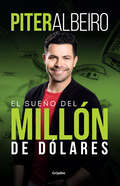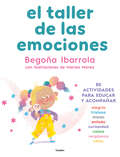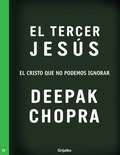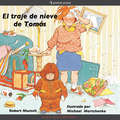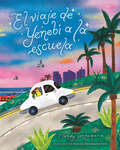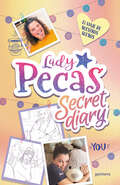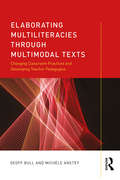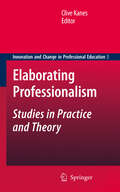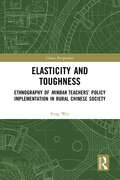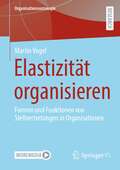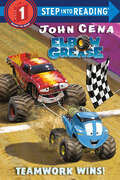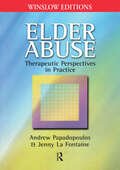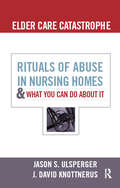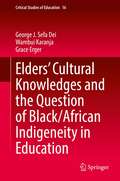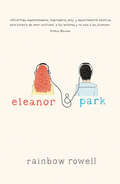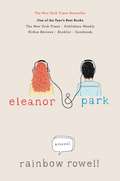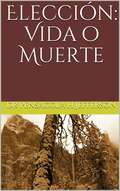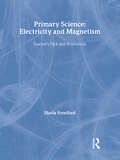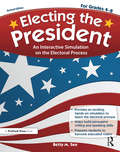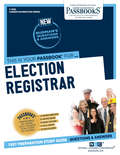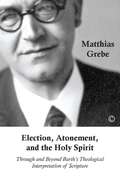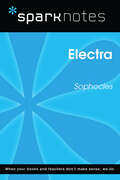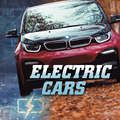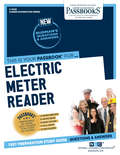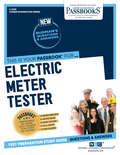- Table View
- List View
El sueño del millón de dólares
by Piter AlbeiroLa historia del famoso comediante Piter Albeiro quien de manera entretenida y divertida nos cuenta su historia como empresario y emprendedor y da consejos para tener éxito en estos campos. Iniciar un negocio exitoso requiere inversión,compromiso, conocimiento y, con frecuencia, muchos, muchos# ¡fracasos! Sí, así como lo leen. Piter Albeiro, uno de los comediantes más reconocidos de Colombia, comparte en este libro sus anécdotas de negocios fallidos, que van desde la vez que inauguró un puesto de fresas con crema hasta cuando creó un club exclusivo para taxistas. Todo esto para aprender a las carcajadas lo que NO hay que hacer para ganar dinero. El sueño del millón de dólares reúne todos los aprendizajes, los tropiezos y los triunfos del autor, con el propósito de hacernos saber que ser exitosos requiere dedicación pero, sobre todo, pasión y mucho amor. Porque los sueños realmente no se cumplen: ¡se trabajan!
El taller de las emociones: 80 actividades para educar y acompañar
by Begoña IbarrolaEl taller de las emociones es un libro de actividades para trabajar la educación emocional con los más pequeños. Ayúdales a reconocer las emociones, a validarlas y respetarlas para que nuestros niños crezcan más sanos y seguros. ¿Qué hace de El taller de las emociones un libro especial? - Está dirigido a los más pequeños de la casa (de 2 a 6 años). - Se puede trabajar tanto en el aula como en casa, en grupo o de forma individual.- Incorpora 80 fichas que trabajan ocho emociones básicas: alegría, tristeza, miedo, enfado, curiosidad, calma, vergüenza y celos. - Bellamente ilustrado y con ideas para que los niños reflexionen. - Lo firma Begoña Ibarrola, referente indiscutible de la educación emocional en España. A través de estas 80 actividades, el niño desarrollará, de una forma divertida y sencilla, habilidades varias, como son la empatía, la escucha activa, la expresión corporal y la comunicación no verbal, entre otras.
El tercer Jesus
by Deepak Chopra¿Quién es Jesucristo?En El tercer Jesús, Deepak Chopra, el líder espiritual y autor de grandes éxitos literarios, nos da una respuesta que, además de edificante, desafía las creencias actuales y da una perspectiva nueva de lo que Jesús puede enseñarnos a todos.No hay un solo Jesús, escribe Chopra, sino tres. En primer lugar, hay un Jesús histórico, el hombre de carne y hueso que vivió hace dos mil años y cuyas enseñanzas constituyen la base de la teología y del pensamiento cristianos. El segundo Jesús es el hijo de Dios, que ha llegado a encarnar una religión institucionalizada con devotos creyentes. Y detrás de esas dos imágenes se encuentra el tercer Jesús, el Cristo cósmico, el guía espiritual cuyas enseñanzas se dirigen a toda la humanidad. Es el Jesús que habla a los individuos que desean encontrar a Dios como experiencia personal y alcanzar la iluminación espiritual.Al interpretar el Nuevo Testamento de una nueva manera, y al volver a lo esencial del mensaje de Jesús, El tercer Jesús puede realmente transformar nuestras vidas y a la humanidad.From the Trade Paperback edition.
El traje de nieve de Tomás
by Robert Munsch Michael MartchenkoTomás se niega a ponerse su traje de nieve a pesar de las súplicas de su madre, su maestra y hasta el director de la escuela.
El viaje de Yenebi a la escuela (Yenebi's Drive to School Spanish edition)
by Sendy SantamariaDreamers meets School's First Day of School in this vibrant story that puts a whole new spin on one loving family's morning drive to school.Entre semana me levanto a las cuatro de la mañana.Me cepillo los dientes, me visto y arrastro a mi hermana Melanie hasta el carro donde nos espera mami.¡Se nos va a hacer tarde! ¡Apúrense!Durante las siguientes dos horas viajaremos en carro. Pasaremos por los vendedores de tamales (mi parte favorita), por la línea (mi parte menos favorita) y cruzaremos la frontera hacia los Estados Unidos. Así es como llegamos a la escuela todos los días. Esta es nuestra rutina. ¡Vamos!Con un tono ganador y radiante, y con una paleta brillante y cordial, la autora-ilustradora Sendy Santamaria hace su debut con esta historia sobre el viaje de una niña, un viaje que la propia Sendy hacía de niña como ciudadana estadounidense residente en México. El viaje a la escuela de Yenebi lleva a los lectores a recorrer un trayecto que muchos reconocerán como muy similar al propio.INSPIRED BY A TRUE STORY: By celebrating the daily details of a child's commute to school that reflects the author's experience, this universal and inviting picture book is truly a mirror, a window, and a door. TIMELY TOPIC: An accessible approach to a serious (and seriously underdocumented) part of American life for many young readers. Teachers, librarians, and parents will appreciate the way this book blends the importance of current events in an easily understandable narrative that kids will enjoy following along with. FAMILY-CENTRIC: The journey described in this story—a loving family's daily trip to school—is timeless and relatable, yet wonderfully specific. UNIQUE EXPERIENCES: Like Last Stop on Market Street, this book leans into the narrator (and creator)'s very particular experience and yet makes the individuality of such an experience highly relatable, communicating to readers that even their most personal routines are part of what connects them with all humans. Young readers who take the bus to school or get driven a few blocks by their parents will see what makes them similar to kids like the author, even if the shape of their routines are different. FRESH APPROACH TO A CLASSIC TOPIC: The author turns the "back to school" trope on its head by making the book all about the trip, rather than focusing on apprehension or excitement about school itself.Perfect for:Teachers and librarians looking picture books in Spanish or by Latinx creatorsParents looking for bilingual content and bicultural kids' booksKids who want to read about experiences different than their ownFans of Dreamers, Our Class is a Family, and The Name Jar
El viaje de nuestros sueños (Lady Pecas Secret Diary #Volumen 2)
by Lady PecasDESCUBRE TODOS LOS SECRETOS Y LOCURAS DE LADY PECAS Querido DIARIO:¡Nos vamos de VIAJE con la clase! Pasaremos dos semanas en la MONTAÑA, ¡es la oportunidad PERFECTA para estar a solas con mi CRUSH! Pero está claro que no puede ser todo tan FÁCIL... ¿quién iba decirnos que terminaríamos PERDIDOS en la nieve? Tendremos que pedir AYUDA a alguien... ¡muy ESPECIAL! ¿Qué voy a hacer ahora? ¿Se pueden tener dos AMORES a la vez? Suerte que te tengo a ti para contártelo todo... ¡Para eso eres mi SECRET DIARY!
Elaborating Multiliteracies through Multimodal Texts: Changing Classroom Practices and Developing Teacher Pedagogies
by Michèle Anstey Geoff BullElaborating Multiliteracies through Multimodal Texts: Changing Classroom Practices and Developing Teacher Pedagogies is the complementary volume to Foundations of Multiliteracies: Reading, Writing and Talking in the 21st Century which provides a comprehensive introduction to multiliteracies, classroom talk, planning, pedagogy and practice. This second volume, embeds an action learning model, encouraging readers to explore classroom practice around multiliteracies, collect data about their pedagogy and enact change. It provides in-depth examination of the five semiotic systems, including a suggested school-wide sequence, explores reading and writing processes with multimodal texts and explains how to develop dialogic practices through talk around multimodal texts. The links between inquiry and action learning are explored in order to demonstrate how these approaches can change classroom practices and talk around multimodal texts. Several features have been designed to help translate knowledge of multiliteracies into effective classroom practice: Graphic Outlines orient the reader to the concepts in the chapter. Reflection Strategies enable the reader to gauge their understanding of key concepts. Theory into Practice tasks enable the trialling of specific theoretical concepts in the classroom. Auditing Instruments inform assessment of student performance and evaluation of teacher pedagogy. QR codes address the multimodal and digital nature of new literacies link the reader to multimodal texts. Action Learning Tasks enable readers to investigate specific aspects of their multiliterate pedagogy, plan and implement change, based on their findings.
Elaborating Professionalism: Studies in Practice and Theory
by Clive KanesWhat are the future possibilities for the standing of professional practice as it faces growingly problematic markets for services, complex demands for managerial accountability and control, and problematic circumstances and expectations in its ethical and self-regulative governance? New sources of inspiration may be needed if professionalism is to be either a viable or desirable form for the social organisation of work in the coming years of potentially deep economic and social change. Set in the UK, South Africa, Australia and the USA, the empirical studies included elaborate problematic situations of professional practice concerning issues of identity and knowledge. The theoretical studies explore the notion of generic processes; elaborate the plurality of notions of professional practice; theorise the hybridisation witnessed in inter-professional and cross-disciplinary team work; and outline new theoretical departures relating to these. Elaborating professionalism also raises important methodological issues relating to professionalism as ethical practice. The book offers valuable resources to enrich practice, and provokes thought and new ideas about professionalism.
Elasticity and Toughness: Ethnography of Minban Teachers’ Policy Implementation in Rural Chinese Society (China Perspectives)
by Feng WeiThis book examines minban teacher policies and their implementation in China between 1949 and 2000, when rural areas were in severe shortage of qualified teachers. During this period of time, minban teachers made great contributions to education, doing the same work as state-employed school teachers while receiving much lower salaries due to non-official status. With solid fieldwork on oral history of minban teachers and policy actors and deep examination of a wealth of policy documents in private and governmental archives, the author records the life history of minban teachers, the process of minban teacher policies, and the interaction between policies and individual strategies in M county (pseudonym), located in northern Jiangsu province of China. The book reveals many interesting and sometimes surprising findings about the characteristics of educational policy implementation in China. While China’s minban teacher policies have come to an end, rural education continues to be a major concern of policymakers and researchers alike. The book is an important piece of scholarship for the readers interested in rural education in China, and in how state, society, and culture interact to influence teacher policies and management in the Chinese context.
Elastizität organisieren: Formen und Funktionen von Stellvertretungen in Organisationen (Organisationssoziologie)
by Martin VogelWozu Stellvertretung in Organisationen? – diese Frage ist trivial: Schließlich ist jede/r einmal krank oder im Urlaub. Wenn dann niemand einspringen kann, kann das weitreichende Folgen haben. Wozu also noch diese Studie? – Weil die Frage trivial ist bzw. weil es interessant ist zu beobachten, wie es (in) einem gegebenen Kontext gelingt, ein Phänomen so erscheinen zu lassen, als sei es trivial. Dieser Band leistet einerseits einen Beitrag zum Verständnis von Stellvertretung in Organisationen: die Klärung des Begriffs, die Einordnung von Stellvertretung als organisationale Struktur und die Ermittlung ihrer Funktionen. Zum anderen unterstützt Martin Vogel die Forderung, systemtheoretische Forschung „empiriefähiger“ zu machen und stellt hierfür eine Forschungsheuristik zur Diskussion. Der Titel „Elastizität organisieren“ rückt ein Konzept Niklas Luhmanns ins Zentrum. Mit Hilfe ihrer Stellen können Organisationen auf sich ändernde Umweltbedingungen reagieren, indem sie Stellen neu schaffen, umwidmen, einsparen oder von Beginn an „ambivalent“ programmieren. Das Buch stellt Stellvertretungen als Beispiel dieser „Ambivalenzstrategie“ vor: Auf der Rückseite ihrer trivialen Funktion dienen sie als voraussetzungsvolle „elastische“ Lösung für vielfältige organisationale Probleme.Elastizität zu organisieren ist kein triviales Geschäft.
Elbow Grease: Teamwork Wins! (Step into Reading)
by John CenaIt's up to Elbow Grease, the little blue monster truck who never gives up, to help his brother and his whole monster truck family in this Step 1 reader from superstar entertainer and #1 New York Times bestselling author John Cena!A fun and fast-paced leveled reader from multitalented mega celebrity John Cena! Elbow Grease and his four monster truck brothers love to race--but even the fastest racers have to slow down every once in a while, whether it's to stop for a tune-up, tire change, or some extra gas. Except Crash is having so much fun, he doesn't want to stop! Can Elbow Grease and his brothers work together to reel Crash in? Young readers will love Elbow Grease and his monster truck family in this Step 1 reader based on John Cena's Elbow Grease picture book series!Step 1 Readers feature big type and easy words for children who know the alphabet and are eager to begin reading. Rhyming and rhythmic text paired with picture clues will help young readers decode the story.
Elder Abuse: Therapeutic Perspectives in Practice (Speechmark Editions)
by Andrew PapadopoulosThis book is primarily aimed at care workers and other practitioners whose roles involve working directly with older individuals, couples and families experiencing abuse, and who seek to enhance their knowledge and skills concerning psychological therapies.
Elder Care Catastrophe: Rituals of Abuse in Nursing Homes and What You Can Do About it
by J. David Knottnerus Jason UlspergerPortraying people who have lived and worked in long-term nursing home facilities, Elder Care Catastrophe reveals how organizational dynamics and everyday rituals have unintentionally led to resident neglect and abuse. Backed up by research and grounded in sociological theory, this book offers alternative models for lessening the maltreatment of people living in nursing homes. It provides critical information for family members struggling with nursing home issues, nursing home employees, policy-makers, students and researchers concerned with elder care issues.
Elders’ Cultural Knowledges and the Question of Black/ African Indigeneity in Education (Critical Studies of Education #16)
by George J. Dei Wambui Karanja Grace ErgerThis book makes a strong case for the inclusion of Indigenous Elders’ cultural knowledge in the delivery of inclusive education for learners who are members of minority communities. It is relevant to curriculum developers, teachers, policy makers and institutions that engage in the education of Black, Indigenous, Latinx and other minority students. This book provides opportunities for exploring the decolonization of educational approaches. It promotes the synthesis of multiple types of knowledge and ways of knowing by making a case for the incorporation of Indigenous knowledges and Indigenous Elders as teachers in learning spaces. The book is of interest to educators, students, and researchers of Indigenous knowledge and decolonizing education. Additionally, it is important for educational policy makers, especially those engaged in looking for strategic solutions to bridging educational disparities and gaps for Indigenous, Black, Latinx and other minority learners.
Eleanor & Park
by Rainbow Rowell#1 New York Times Best Seller! "Eleanor & Park reminded me not just what it's like to be young and in love with a girl, but also what it's like to be young and in love with a book. "-John Green, The New York Times Book Review Bono met his wife in high school, Park says. So did Jerry Lee Lewis, Eleanor answers. I'm not kidding, he says. You should be, she says, we're 16. What about Romeo and Juliet? Shallow, confused, then dead. I love you, Park says. Wherefore art thou, Eleanor answers. I'm not kidding, he says. You should be. Set over the course of one school year in 1986, this is the story of two star-crossed misfits-smart enough to know that first love almost never lasts, but brave and desperate enough to try. When Eleanor meets Park, you'll remember your own first love-and just how hard it pulled you under. A New York Times Best Seller! A 2014 Michael L. Printz Honor Book for Excellence in Young Adult Literature Eleanor & Park is the winner of the 2013 Boston Globe Horn Book Award for Best Fiction Book. A Publishers Weekly Best Children's Book of 2013 A New York Times Book Review Notable Children's Book of 2013 A Kirkus Reviews Best Teen Book of 2013 An NPR Best Book of 2013
Eleanor and Park
by Rainbow RowellSet over the course of one school year in 1986, this is the story of two star-crossed misfits-smart enough to know that first love almost never lasts, but brave and desperate enough to try. <P><P>When Eleanor meets Park, you'll remember your own first love-and just how hard it pulled you under.
Elección: Vida o Muerte
by Dr Helena Pensacola“… Pablo comenzó a amonestarlos, y les dijo:“ Varones, percibo que el viaje ciertamente será con daños y grandes pérdidas, no solo del cargamento y del barco, sino también de nuestras vidas ”. Pero el centurión fue más persuadido por el piloto y el capitán del barco que por lo que Pablo estaba diciendo ... Pablo se paró en medio de ellos y dijo: “Hombres, deberían haber seguido mi consejo y no haber zarpó de Creta e incurrió en este daño y pérdida… ”(Hechos 27: 9-21 NASB). * “… Pablo comenzó a amonestarlos…” como portavoz del corazón de Dios (Hechos 27: 9 NASB). La PALABRA de Dios fue escrita para nuestra amonestación y advertencia. "... Todas estas cosas les sucedieron como ejemplos: y están escritas para nuestra amonestación (advertencia) ..." (1 Corintios 10:11 RV). Dios envía Boquillas para su PALABRA para aconsejar y enseñar a su pueblo sobre ELEGIR el camino correcto. "... Todas las cosas que se escribieron antes, para nuestra enseñanza se escribieron, a fin de que por la paciencia y la consolación de las Escrituras tengamos esperanza ..." (Romanos 15: 4). “… Pablo se puso de pie en medio de ellos y dijo:“ Hombres, deberían haber seguido mi consejo… ”(Hechos 27:21 NASB). “… La ley del SEÑOR es perfecta, restaura el alma; El testimonio del SEÑOR es seguro, que hace sabio al simple. Los preceptos del SEÑOR son rectos, alegran el corazón; El mandamiento del SEÑOR es puro, ilumina los ojos. El temor de Jehová es limpio, perdurable para siempre; Los juicios del SEÑOR son verdaderos; todos son justos. Son más deseables que el oro, sí, que mucho oro fino; Más dulce también que la miel y las gotas del panal. Además, por ellos tu siervo es advertido. Al guardarlos hay gran recompensa… ”(Salmo 19: 7-11 NASB). “… Pablo… dijo“… debiste haber seguido mi consejo… ”(Hechos 27:21 NASB). Pablo era un portavoz dado por Dios y había
Elect&Mag Prim Sci: Teacher's Cd-rom Pack For Key Stages 1 And 2
by Fabienne Brochier Mike Diprose Nabeel Nasser Sheila StratfordFirst published in 2004. Routledge is an imprint of Taylor & Francis, an informa company.
Electing the President: An Interactive Simulation on the Electoral Process (Rev. Ed., Grades 4-8)
by Betty M. SecElecting the President is a motivating, hands-on simulation that lets students experience the exciting process of electing the President and Vice President of the United States. As the two parties square off, students take on the roles of candidates, convention delegates, and members of the Electoral College. Updated to reflect the most recent Census data, this book includes complete teacher instructions and all necessary student handouts to provide an easy-to-stage simulation that can be used with small or large groups.
Election Registrar: Passbooks Study Guide (Career Examination Series)
by National Learning CorporationThe Election Registrar Passbook® prepares you for your test by allowing you to take practice exams in the subjects you need to study. It provides hundreds of questions and answers in the areas that will likely be covered on your upcoming exam.
Election, Atonement, and the Holy Spirit: Through and Beyond Barth's Theological Interpretation of Scripture
by Matthias GrebeElection, Atonement, and the Holy Spirit' is an examination of the doctrines of election and atonement in Karl Barth's 'Church Dogmatics', taking up Barth's own challenge to his reader to surpass his argument and offer a better typological interpretationof the cultic texts. Barth's radical re-working of Calvin's doctrine of election is one of the most important developments in twentieth-century theology. Christ synthesizes for Barth a particular dialectic: the binary structure of God's Yes of election and God's No of rejection. The book's central question - how can Jesus simultaneously be both the elected and the rejected (CD II/2), acting as both the judge and the judged (CD IV/1)? - is followed by an exploration of the roles of the Holy Spirit and human freedom in God's electing and saving action. Although commentators acknowledge Barth's innovation in this area but also identify problems with his approach, few have offered what David Ford has called a correction 'from within' Barth, using Barth's ownmethod. Using the concept of Existenzstellvertretung, this critique of Barth's exegetical justification for the doctrines offers an alternative exegesis that not only provides this much-needed correction, but also immerses the reader in a fresh engagement with Scripture itself.
Electra (SparkNotes Literature Guide Series)
by SparkNotesElectra (SparkNotes Literature Guide) by Sophocles Making the reading experience fun! Created by Harvard students for students everywhere, SparkNotes is a new breed of study guide: smarter, better, faster.Geared to what today's students need to know, SparkNotes provides:chapter-by-chapter analysis explanations of key themes, motifs, and symbols a review quiz and essay topics Lively and accessible, these guides are perfect for late-night studying and writing papers.
Electric Cars (Wild About Wheels)
by Nancy DickmannA car zips down the street. But you don't hear the engine rumbling. Why? It's an electric car! Electric cars are becoming more common around the world. Young readers will get a basic introduction to the main parts of these vehicles. They will see how electric cars are different from gas-powered vehicles and why electric cars are better for the environment. Get young readers excited about electric vehicles!
Electric Meter Reader: Passbooks Study Guide (Career Examination Series)
by National Learning CorporationThe Electric Meter Reader Passbook® prepares you for your test by allowing you to take practice exams in the subjects you need to study. It provides hundreds of questions and answers in the areas that will likely be covered on your upcoming exam, including but not limited to: meter reading; basic electricity; mechanical aptitude; understanding and interpreting written material; arithmetic computations; and more.
Electric Meter Tester: Passbooks Study Guide (Career Examination Series)
by National Learning CorporationThe Electric Meter Tester Passbook® prepares you for your test by allowing you to take practice exams in the subjects you need to study. It provides hundreds of questions and answers in the areas that will likely be covered on your upcoming exam.
